Introducing The Hockey Writers’ Countdown to Puck Drop series. From now until the puck drops on the 2019-20 NHL’s regular season on Oct. 2 when the Toronto Maple Leafs host the Ottawa Senators, we’ll be producing content that’s connected to the number of days remaining on that particular day. Some posts may be associated with a player’s number, while others will be connected to a year or length of time. We’re really excited about this series as we take you through the remainder of summer in anticipation of the return of NHL hockey.
When the Atlanta Thrashers moved from the Peachtree State to Manitoba in 2011, it became quite quickly and abundantly clear the team True North Sports & Entertainment had bought to be the “Winnipeg Jets 2.0” would need a complete overhaul if it was to be a contender.
It was a team bereft of anything resembling meaningful organizational depth; one who’s roster laid bare its’ management’s sheer incompetence at the draft table during their 12-year stint in Atlanta.
As a result, the 2011-12 Jets were a transient team with an extra-large roster; they iced some pretty questionable guys and fringe players who didn’t have much business being in the NHL. Overall, the Jets used 38 players during their inaugural campaign, a team record to this day.
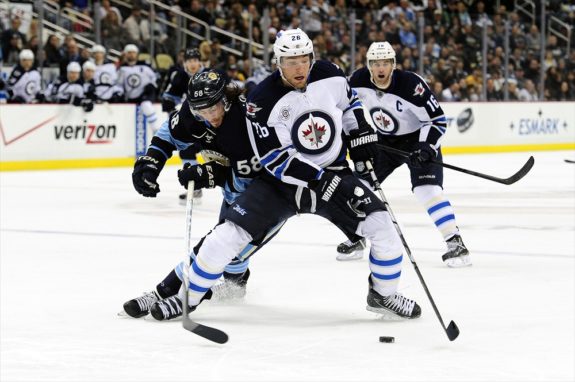
Not coincidentally, we are also 38 days away from the start of the 2019-20 NHL season (although we actually have to wait 39 days for the Jets’ season-opener against the New York Rangers.) Here’s a look at all the guys who donned the Jets’ crest eight years ago, sorted into seven convenient categories.
The Core Talent
Zach Bogosian, Dustin Byfuglien, Toby Enstrom, Andrew Ladd, Bryan Little, Mark Stuart, and Blake Wheeler.
It may be a stretch to call them stars, but these were the guys who carried the mail for the Jets — the most talented of all who came over from Atlanta.
Just 21-years-old in his first season in Winnipeg, Zach Bogosian shouldered a heavy role. The 2008 third-overall pick had his best season as a pro, acting as a stalwart on the Jets’ d-corp. He recorded 30 points (a total the now 29-year-old has never matched) while skating an average of 23:19 and putting up decent possession numbers.
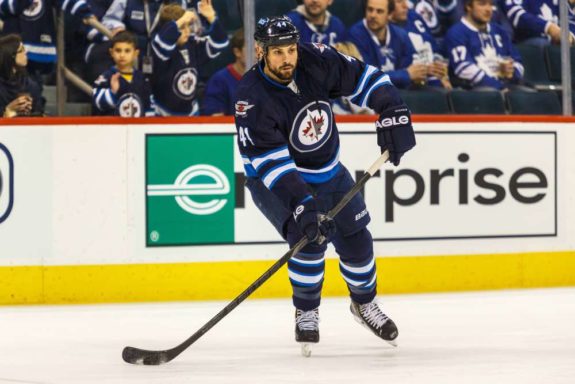
Dustin Byfuglien didn’t make a very good impression on his new owners. He was arrested in Minnesota for boating under the influence of alcohol just a few weeks before training camp.
When it came to being on the ice, however, he excited and frustrated fans and front office alike with his tendencies to pinch recklessly and play fast-and-loose with the definition of what it means to be a defenseman. He’s since become much more responsible now that there’s not so much pressure on him to produce offence.
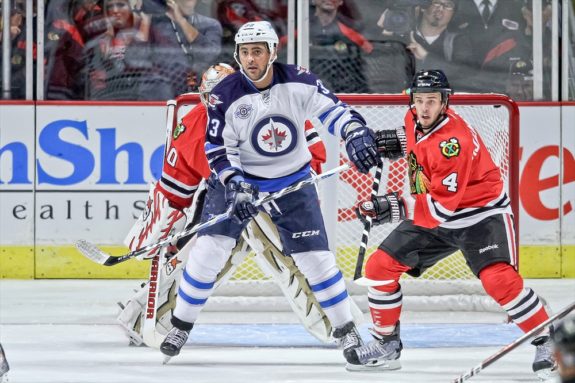
The hulking d-man showed what he still shows today as one of only a few players to play for the Thrashers left with the franchise — a cannon of a shot, the capability to blast opponents into next week, and an ability to turn any game on its ear. He finished third in scoring with 53 points and skated a team-high 24:07.
The diminutive Toby Enstrom, meanwhile, was Byfuglien’s d-partner who was often abandoned and left to fend for himself by the cavalier Minnesotan.
Sometimes rightly, more oftentimes wrongly a lightning-rod for criticism during his seven seasons in Winnipeg, the Swede recorded 33 points in 2011-12, down from the 51 points he’d recorded in the Thrashers’ final season.
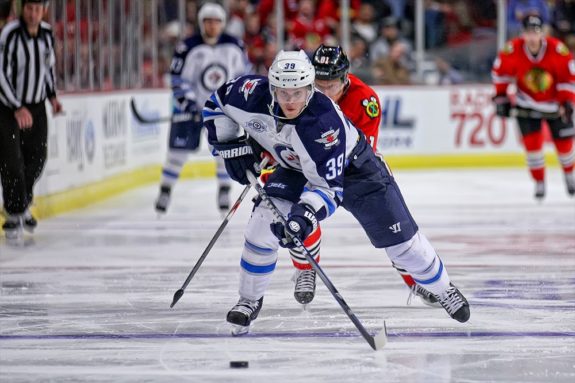
The Jets’ first captain, Andrew Ladd was a consummate professional and a top-notch guy. When many pundits were disparaging Winnipeg and doubting its ability to support an NHL franchise, Ladd signed a five-year contract instead of a one-year deal (he could have tested the market as a UFA after the season).
The signing showed Ladd was committed to the market and lent Winnipeg instant legitimacy. He even took a trip to the new NHL market a month before the season started, paying for it out of his own pocket.
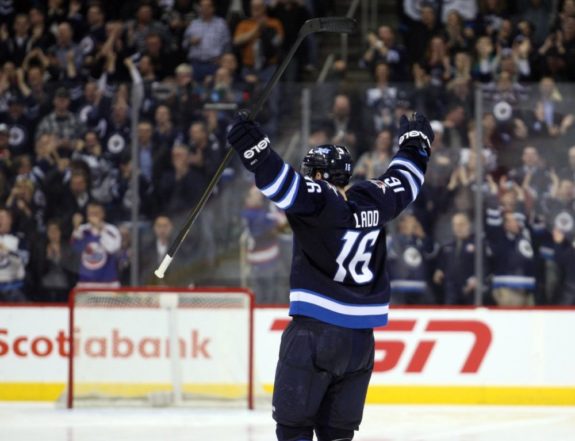
Ladd was second on the team with 28 goals, and added 22 assists, in 2011-12; he played for the Jets until they traded him to the Blackhawks in 2015-16.
Bryan Little, meanwhile, did more to endear himself to Jets’ fans than Byfuglien did, changing his number from #18 to #10 out of respect for Jets 1.0 legend Dale Hawerchuk, who put up 379 goals and 929 points with the Jets over nine seasons.
Related: Winnipeg Jets’ 50-Goal Scorers
“I have seen already how much the fans there have cherished Jets history,” Little said. “So I’m going to be switching to 18.”
Bryan Little (from ‘On second thought, 10 not perfect,’ Winnipeg Free Press, 08/2/2011.)
The then-23-year-old centre had an unspectacular, but solid season, putting up 46 points in a top-six role. Even today, Little can be depended on to produce between 40 and 50 points per season; he’s notched between 41 and 47 points in each of his last four campaigns and still has five years left on his contract.
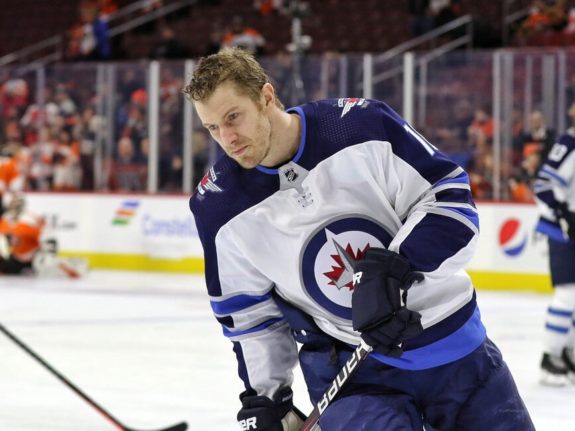
Like Bogosian and Byfuglien, Mark Stuart was also a key member of the Jets’ defence. A former Boston Bruin who came to Atlanta in 2011 along with Blake Wheeler in a trade that sent Rich Peverley the other way, the big-bodied defensive d-man led the team in shot blocks by a wide margin with 182 and was second only to Tanner Glass in hits with 198.
The other player the Thrashers received in the Peverley trade was Blake Wheeler. Twenty-five years old at the time, the late-blooming 2004 fourth-overall pick hadn’t come into his own as an NHLer, but had a real coming-out party in his first season in Winnipeg. He scored 17 goals and tallied 47 assists for 63 points, which was a new career-high and also led the team.
Since then, Wheeler has recorded 60-plus points in every season but the lockout-shortened 2012-13 season. The now-Jets’ captain has notched a cool 91 in each of his last two seasons and seems to be getting better with age. Only Nikita Kucherov and Connor McDavid have more assists since the start of the 2017-18 season.
The Up-and-Comers
Alexander Burmistrov, Patrice Cormier, Evander Kane, and Mark Scheifele.
Alexander Burmistrov was considered by many as having the potential to be the next Pavel Datsyuk, as he possessed similar playing making ability and creative flair.
Chosen eighth-overall in 2010 and undoubtedly of the most talented youngsters in the Thrashers’ system, Burmistrov had his best NHL season in 2011, putting up 28 points and getting fans excited for what the future could hold for the Russian. The future, however, brought nothing but frustration — his career would quickly fall off quite the cliff.
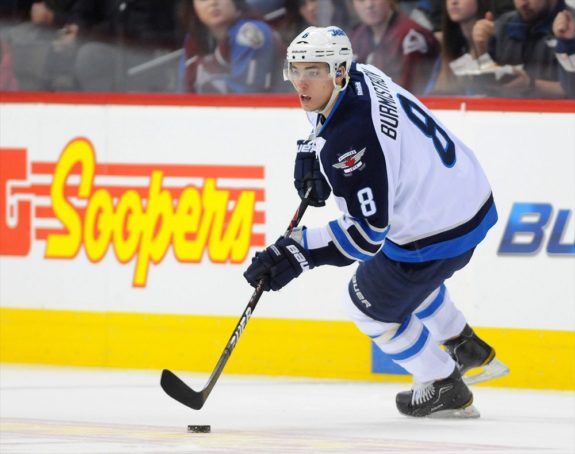
Patrice Cormier, meanwhile, was already damaged goods by the time he came to Winnipeg. He had a productive junior career with the QMJHL’s Rimouski Oceanic, had even captained Canada’s World Junior team in 2010, and was considered at one point to be a promising prospect, selected by the New Jersey Devils in the second round in 2008.
However, an ugly incident cast a shadow over the young centre’s career he could never emerge from. In just his third game as a member of the Rouyn-Noranda Huskies in 2010, Cormier delivered a vicious and deplorable elbow to opponent Mikael Tam’s head, which sent Tam into convulsions. Cormier received a season-long suspension and the Devils traded him to the Thrashers soon after.
Cormier played nine games for the Jets in 2011 and was held pointless. He remained with the organization through 2016-17, spending his last two seasons as Manitoba Moose captain.
One player who wasn’t damaged goods — but eventually wore out the welcome mat in Winnipeg with a variety of on- and off-ice antics — was Evander Kane.
The 2009 fourth-overall pick, coming off a 43-point sophomore campaign, put his quick release and pure scoring ability on display. He lit the lamp 30 times (he wouldn’t reach the 30-goal plateau again until 2018-19) and added 27 assists.
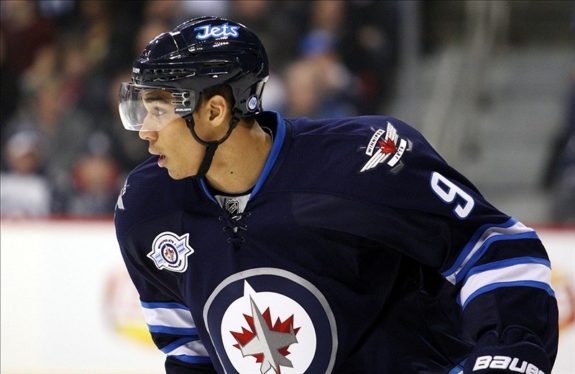
Lastly, now-superstar sniper Mark Scheifele — back then, a raw and gangly teen that many were angry GM Kevin Cheveldayoff chose instead of Sean Couturier — played his first seven NHL games, scoring one goal, before being sent back to the OHL’s Barrie Colts.
The Muckers and Grinders
Jim Slater, Tanner Glass, Antii Miettinen, and Chris Thorburn
None of these bottom-six forwards had a ton of pure talent. Rather, they were role players who had varying degrees of success (three of whom made up the popular “GST” line.)
Tanner Glass, “the G,” signed a one-year, $750,000 contract with the Jets that July after two seasons with the Vancouver Canucks. The left-winger set new career-highs in goals (five) and points (16), but signed with the Pittsburgh Penguins the following year.
Jim Slater, the “S,” also set a new career-high in goals and points with 13 tallies and 21 total points in 78 games. A face-off specialist, Slater won more than 54 percent of his draws and saw time on the penalty kill.
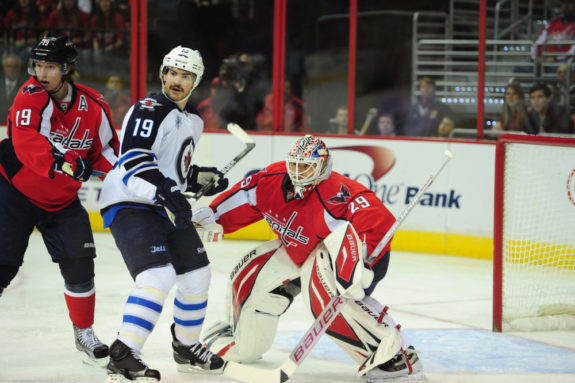
Chris Thorburn, the “T,” was mostly known for his willingness to defend his teammates by engaging in fisticuffs. Well-liked and well-respected in Winnipeg for his strong character, Thorburn dropped the mitts 11 times in 2011-12 and was second on the team in penalty minutes with 83. He also found time to tally four goals — including this toe-drag beauty on Ryan Miller — and seven assists for 11 points.
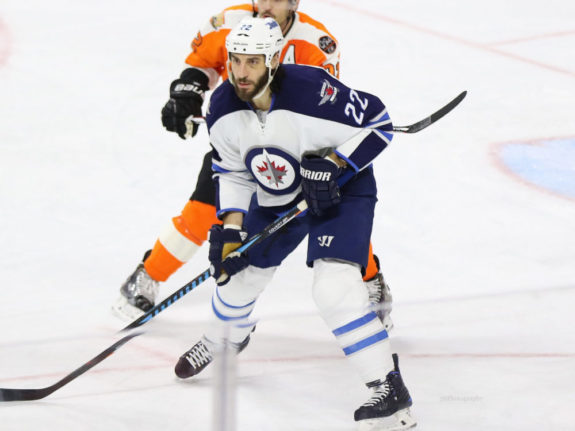
Finally, Miettinen was claimed off of waivers in December. The Finn played 45 games down the stretch, logging 16 points. He played a further 22 games, registering 5 points, in the lockout-shortened 2012-13 campaign before finishing his career in Europe.
The Short-Lived Scorers
Nik Antropov, Tim Stapleton, and Kyle Wellwood
These three had good seasons, but were not long-lived players for the Jets.
Antropov was one of the most experienced and oldest Jets. At 31-years-old, he already had 11 NHL seasons and 412 points under his belt. He’d been with the Thrashers — his third NHL team — since signing a four-year deal in 2009.
The hulking Kazakh and Maple Leafs’ 1998 first-round pick never truly used his 6-foot-6, 245-pound frame to his advantage, and was generally a soft player, but did finish seventh in team scoring with 15 goals and 20 assists — the most notable being the first goal in Jets 2.0 history.
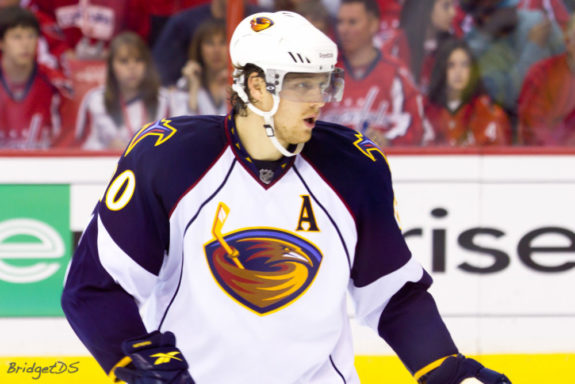
Antropov stuck around for the lockout-shortened 2012-13 season, tallying a further 18 points, before signing with the KHL’s Barys Astana.
Stapleton, 29, was an undrafted forward who’d been with the Thrashers since 2009 and had played 45 games the season before (he scored the last goal in Thrashers history.)
Stapleton set career-highs in games played and points scored in 2011-12, suiting up for 63 games and putting up 27 points. The Jets didn’t re-sign him following the season and he never played another NHL game.
Kyle Wellwood was arguably the Jets’ biggest offseason acquisition. The Jets snagged the UFA veteran of six NHL campaigns — who had put up as many as 45 points in a season — in early September for the bargain-basement price of $700,000.
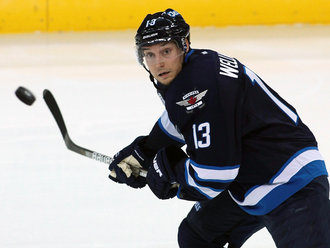
Despite being the butt of some jokes about his fitness levels in the years prior (earning the unflattering moniker “Kyle Well-Fed,)” Wellwood was consistent as a Jet, setting a career-high with 47 points.
Wellwood played for the Jets the next season, too, but his production dipped to just 15 points in 39 games. In Oct. 2013, he chose to retire.
The Defensive “Depth”
Grant Clitsome, Brett Festerling, Mark Flood, Ron Hainsey, Arturs Kulda, Randy Jones, Derek Meech, Johnny Oduya, and Paul Postma
One big reason the inaugural Jets failed to make the playoffs and finished just two games above .500 in a weak Southeast Division was their transient blue line. No fewer than 13 players patrolled the 2011-12 d-corp that gave up 246 goals — the four classified as “The Core Talent” and the motley crew listed just above.
Of the nine, only four — Johnny Oduya, Ron Hainsey, Randy Jones, and Mark Flood — played more than a dozen games.
Oduya played 66 games and often gave up terrible turnovers, which then head-coach Claude Noel described as “free pizzas.” Before the season ended, Oduya was gone, traded to the Chicago Blackhawks in February.
Hainsey played in 56 games, notching 10 assists while logging an average 21:06 and trailing only Mark Stuart with 133 blocked shots.

Jones, a low-cost offseason depth add, played in 39, registering one goal and one assist. Mark Flood, an offensive d-man and former Manitoba Moose, played 33 games, registering three goals and four assists.
Perhaps the most disappointing of the whole bunch was Derek Meech, who played in just two games and was injured virtually the entire season.
The Plugs
Eric Fehr, Aaron Gagnon, Jason Jaffray, Karl Klingberg, Spencer Machacek, Brett Maclean, Ben Maxwell, and Kenndal McArdle.
These guys were the guys the Jets played because they had to, not because they wanted to.
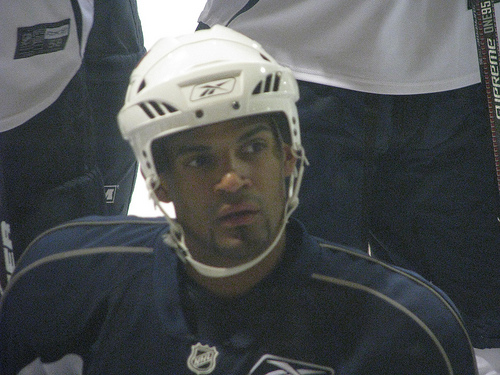
Aside from Karl Klingberg — who was a second-round pick with at least a little profile — and Jason Jaffray — who was a known commodity in the city due to playing several excellent seasons with the Manitoba Moose — chances are most Jets fans don’t even remember half these names.
Related: 5 Completely Forgettable Jets Call-Ups
Only one guy on the above list played more than 13 games for the Jets in 2011-12 — Eric Fehr suited up for 35 in what was a tremendously disappointing season for the local talent — and none of them did anything of much importance.
Combined, they put up 20 points in 97 total man-games, and only Gagnon and Klingberg appeared in any games for the Jets outside the 2011-12 season.
The Goalies
Peter Mannino, Chris Mason, and Ondrej Pavelec
Ondrej Pavelec, coming off his first season as a number-one goaltender in the Thrashers’ final season, posted a 29-28-9 record during his first season in Winnipeg. His 2.91 goals against average, a .906 save percentage were fairly pedestrian, although put up in front of a less-than-stellar defense (as explored above.)
Those numbers, in retrospect, were pretty similar to the numbers he went on to post in his five Jets’ seasons that followed. Another hallmark of his play that was on display in 2011-12 was his penchant for making unthinkable saves but also allowing stinkers.
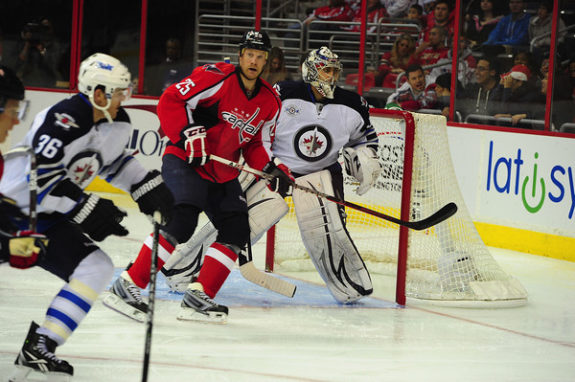
Pavelec also had four shutouts, including the first in Jets’ 2.0 history when he stopped all 34 shots he faced against the New York Islanders on in a 3-0 Nov. 3 victory.
Mason, the backup and oldest player on the Jets that season, played out the final year of a two-year deal he signed with the Thrashers in 2010.
The then 35-year-old posted and 8-7-1 record, 2.59 GAA, a .898 SV%, and recorded two shutouts in his 14th professional hockey campaign overall and only one with the Jets.
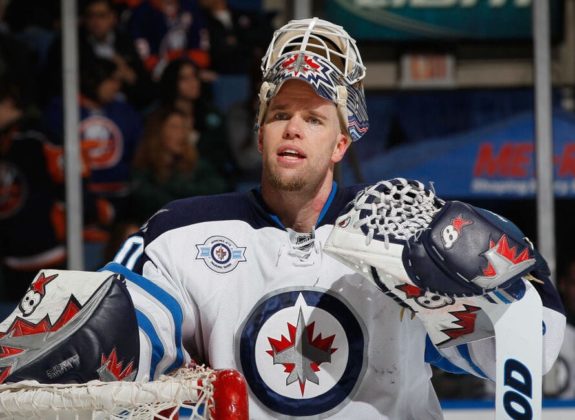
Mannino occupied the blue paint for a grand total of one period of relief, which came during a November 5-2 loss versus the Florida Panthers. He faced four shots and stopped them all. The appearance was his only as a Jet and his last-ever of his six the NHL.
Jets Have Kept Roster Slimmer Ever Since
The closest the Jets have come to using 38 players again was in 2014-15, when they used 35. Last season, they used just 32.
How many will players will wear the Jets’ jersey in 2019-20? The answer to that question won’t come until next April, but it likely won’t be 38 like eight seasons ago.